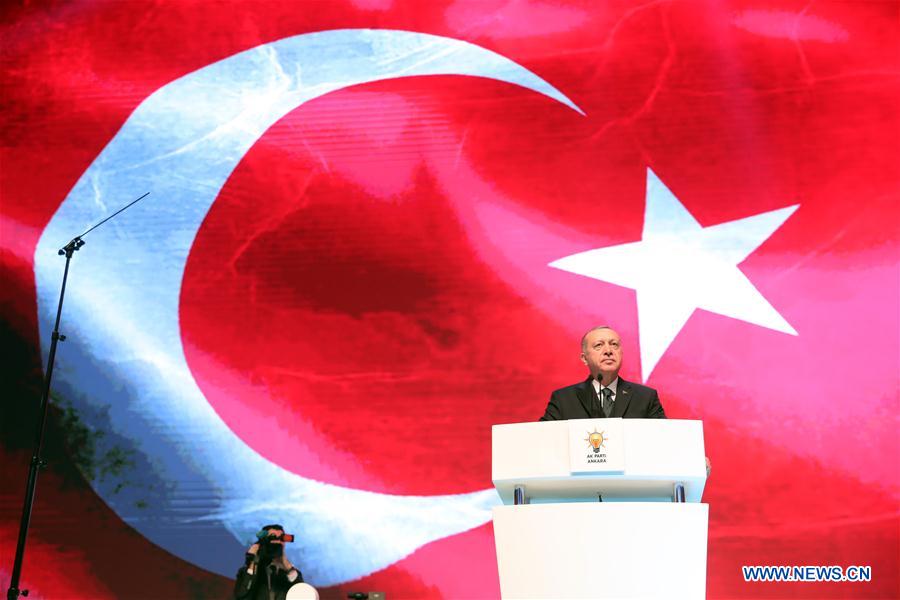
Turkish President Recep Tayyip Erdogan speaks during a meeting of his ruling Justice and Development Party in Ankara, Turkey, on March 2, 2020. Recep Tayyip Erdogan said on Monday that he expects a cease-fire deal in Syria's northwestern province of Idlib during a planned meeting with his Russian counterpart Vladimir Putin. (Photo: Xinhua)
After suffering its worst casualties in years, Turkey has launched a new major offensive against the Russia-backed Syrian forces in Idlib, but analysts said the spiking Russian-Turkish tensions are expected to ease off through a meeting this week between the leaders of the two countries.
Turkey announced on Sunday that it had launched operation "Spring Shield" in northern Syria in order to increase Turkey's involvement in the neighboring country's civil war.
Meanwhile, Turkish President Recep Tayyip Erdogan will travel to Moscow on Thursday to meet his Russian counterpart Vladimir Putin, a crucial meeting after the two countries have come to the brink of a direct confrontation in Idlib.
"I hope that during our discussions (in Moscow), Putin will take the necessary measures there, such as a cease-fire, and that we will be able to find a solution to this matter," Erdogan told members of his party in Ankara on Monday, raising hopes for a compromise.
Experts agreed that Turkey's response to the deaths of over 50 soldiers in Idlib since the start of February is out of the ordinary.
"There is currently a state of undeclared war between Turkey and Syria," Oytun Orhan, a senior analyst at the Ankara-based Center for Middle Eastern Studies, told Xinhua.
He explained that despite the diverging interests between Turkey and Russia in Idlib, a compromise seems very likely through the meeting.
But "they will not stand down and will negotiate by means of military force on the table and on the ground," Orhan added.
Pointing to an ongoing "arm wrestling" in northwestern Syria between Ankara and Moscow, and their proxies: the Syrian army and rebels, the expert said not sides will have to give up some of their demands to reach common ground.
Observers believed that Turkey's strategy is to annihilate as many Syrian military targets as possible until the Moscow meeting in order to have the upper hand.
"Our military will finish the job at hand there, until a new order," a Turkish source close to the government told Xinhua.
It is worth noting that the two leaders have been instrumental in the past, especially after the downing of a Russian warplane over Syria by Turkey in 2015, in bridging differences between their nations which are backing opposing sides in Syria.
For several years, Moscow and Ankara have been bickering over the Syrian issue despite their growing cooperation in other fields, such as energy, trade and tourism, before the killing of 34 Turkish soldiers in an airstrike in Idlib last week eventually brought things to the boil.
Turkey, which has concerns about its national security with a vast number of displaced Syrians flooding to its borders, has considerably beefed up its military presence in northern Syria in recent weeks, deploying over 9,000 troops.
A stand-off between Russia and NATO ally Turkey over Idlib, the last rebel stronghold the Russia-backed Syrian army has been trying to recapture since last December, could have effects far beyond the Syrian theater, so it is necessary for both parties to diffuse it, observers said.
Orhan expected that a possible Turkish-Russian compromise could lead to the establishment of a 30-km-deep safe zone in Idlib, including securing the region's main strategic highway.
This would determine the fate of up to 3 million refugees who have been trapped in the area and along the borders.
Turkey sees a new refugee wave as a threat to its security, as the nation is already hosting some 3.7 million Syrians since the start of the civil war in the neighboring country nine years ago.
On Sunday, the Turkish Defense Ministry said it had shot down two Syrian warplanes, adding over 2,200 Syrian soldiers have been killed or wounded in Turkey's onslaught.
But it is also time for a reality check for Turkey, argued Serkan Demirtas, a political analyst.
"Over 50 Turkish soldiers were killed in less than a month in the wrestling between Ankara and Moscow," he told Xinhua.
The policymakers in Ankara somewhat "miscalculated" the situation on the ground, laboring under the impression that Turkey's massive military deployment in Idlib in recent weeks would deter the Russian alliance, Demirtas said.
"This region can no longer handle another conflict," the Turkish analyst noted, urging Moscow and Ankara to bridge their differences through diplomacy and compromise.


